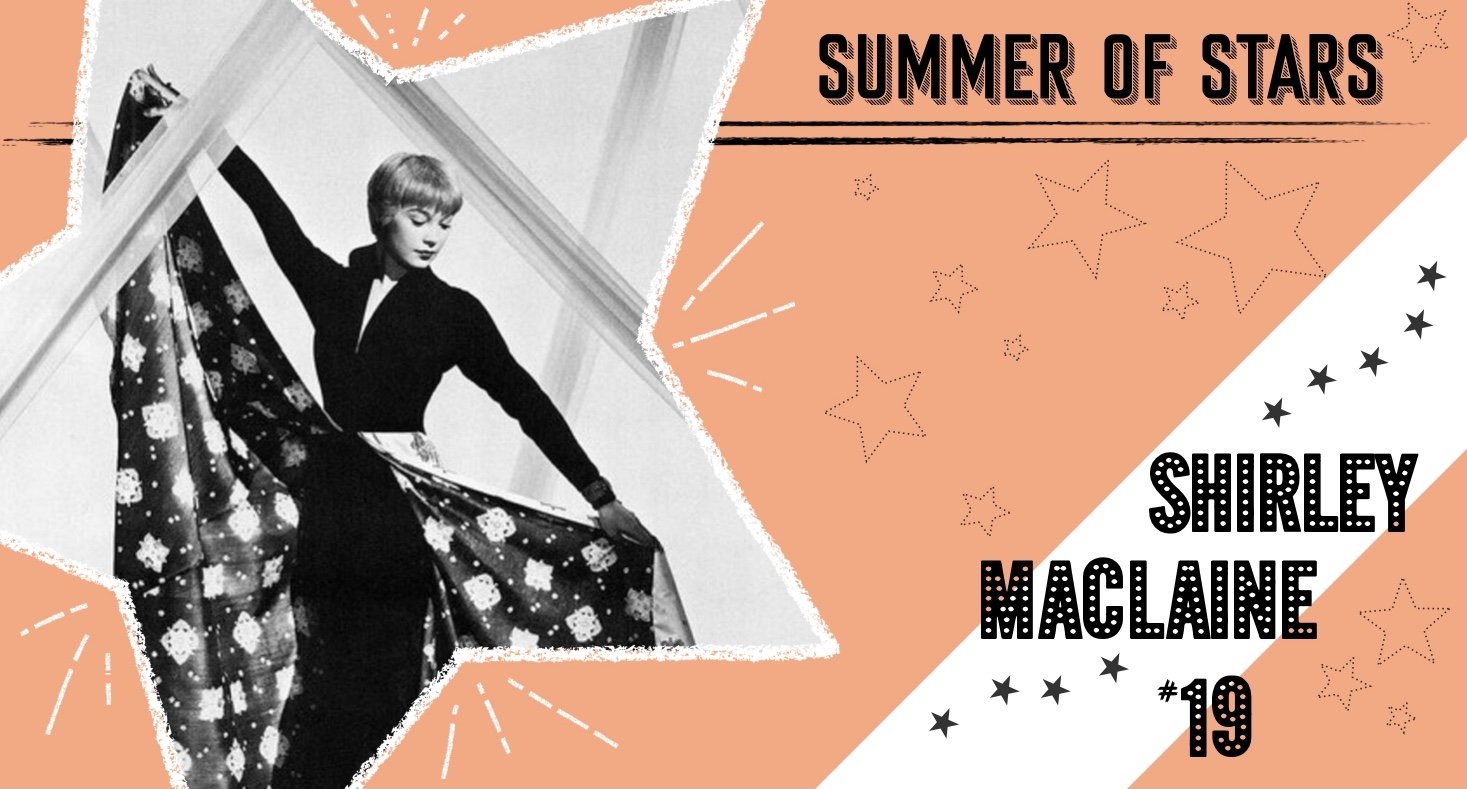SUMMER OF STARS #19: Shirley MacLaine
Summer of Stars is a MovieJawn celebration of actors that have shined on the silver screen. Follow along as we count down some of our favorite players from various eras in the magical cosmos of cinema.
Feminist Icon Shirley MacLaine and her Dynamic Duos
by Matthew Crump, Staff Writer
Even though Shirley MacLaine resists the label “legend”, her presence on MovieJawn’s “Summer of Stars'' count down makes such titles unavoidable. With a career highly decorated with over a dozen award wins and dozens of more nominations, it’s no wonder that MacLaine is regarded as one of Hollywood’s most prominent leading ladies.
Yet, for a woman who constantly proves herself capable of acting at the helm of a project, she does not shy away from sharing the screen with her female co-stars. Whether this is an intentional effort to practice the outspoken feminist viewpoints she preaches, a reflection of the industry’s resistance to allow seasoned actresses solo leading parts, or the happy accident of just doing projects with people she loves, today we’re taking a look at Shirley MacLaine and the way she’s built a career for herself and the women around her.
Terms of Endearment (dir. James L. Brooks, 1983)
MacLaine got her start from a sprained ankle that promoted her from understudy to lead, eventually leading her even further to a breakout role in The Trouble with Harry (1955), directed by Alfred Hitchcock. 28 years and 36 credits later she immortalized the character of Aurora Greenway who MacLaine openly acknowledges as her favorite role, and it’s not just because she’s what got her the Oscar.
1977’s The Turning Point, seems to have been just that for MacLaine; now in her early 40s, gone were the days of playing daughters and ingenues. Where many actresses before her struggled to catch the second wind of their careers, MacLaine didn’t seem quite as phased, saying, “The transition into being an older actress was not all that difficult, it really came down to where are the great parts rather than what will I look like and what will they think of me?”
Starring alongside the freshly Oscar-nominated Debra Winger, the two actresses captured a mother/daughter relationship that is among the most memorable to have ever hit the screen. Perhaps their dynamic is best captured when, toward the end of the film, Aurora says she always thinks of them as fighting, to which her daughter responds, “that’s because you’re never satisfied with me.” The southern charm and acerbic wit that MacLaine brings to the character makes her impossibly lovable despite all her flaws. With Aurora navigating everything from newfound love to unexpected tragedy, it’s this emotional range that finally led MacLaine to her long-deserved Oscar win.
The Children’s Hour (dir. William Wyler, 1961)
It would be a great disservice to MacLaine and her long-standing career to gloss over the first 30 years. MacLaine gained several nods from the academy throughout the Golden Age’s swan song, receiving best actress nominations for her roles in Some Came Running (1958), The Apartment (1960), and Irma La Douce (1963). However, an early role where she gives just as deserving of a performance and shares the screen with a female co-star is this under-recognized gem.
A remake of the straight-washed These Three (1936), The Children’s Hour makes a repartive return to the source material: a play by the same name that follows two school teachers whose lives are jeopardized when they are accused of lesbianism. While certainly controversial for the time period, this film made history by offering the first open acknowledgement of homosexuality under the dwindling power of the Hays Code.
While Audrey Hepburn’s performance seems to be the only one critics noted at the time, MacLaine undoubtedly carries the film’s heavy emotional weight, particularly during what is the first coming out scene in cinematic history. A staunch believer in reincarnation, it should come as no surprise that MacLaine often feels as if she channels real people through her acting, an experience she spoke about with her role as a Russian piano teacher in Madame Sousatzka (1988). Almost 30 years prior, her performance in The Children’s Hour seems to reflect a similar out-of-body experience, resulting in an unforgettable portrayal of the shame and torment that has historically been inflicted on the LGBTQ+ community.
Postcards from the Edge (dir. Mike Nichols, 1990)
Returning to the twisted mother roles that MacLaine seemed to become associated with following her award-winning part in Terms of Endearment, among the very best of these performances is her role in Postcards from the Edge alongside Meryl Streep. Written by Carrie Fisher, the film follows two actresses who also happen to be mother and daughter, the latter of which having just gotten out of rehab. Though Mike Nichols and Fisher both insisted the film is by no means autobiographical, it’s worth noting that Debbie Reynolds, Fisher’s mother, did campaign for the part but Nichols chose Shirley MacLaine instead.
While the mother/daughter dynamic in this film is more rare and specific, the range of outright anger and tender vulnerability arguably offers even more material than Terms in the way of female complexity. It’s so much fun to watch MacLaine and Streep volley that the handful of scenes without the two of them together seem to pale in comparison. The role also allowed MacLaine to revive her musical roots with an unforgettable song and dance number aptly titled “I’m Still Here” being performed atop a parlor room piano (with lyrics written by Shel Silverstein). Despite MacLaine not receiving an Academy Award nomination alongside Streep that year, Postcards from the Edge still remains as evidence of some of her best screen chemistry yet.
Wild Oats (dir. Andy Tennant, 2016)
While this small-budget flick is unlikely to ever grace the top of MacLaine’s IMDb credits, it’s a prime example of her choosing to do a film for the people instead of personal profit. The film follows two retired friends who run away to the Canary Islands together after receiving a misprinted five million dollar life insurance check. While MacLaine and co-star Jessica Lange are the only real redeemable parts of the film, it’s still fun to watch the two of them get into shenanigans in the tropics together; their real-life friendship certainly does shine through.
Bringing two renowned actresses to the middle of paradise on a shoestring budget— what could go wrong? According to MacLaine, a lot. Neither her nor Lange seemed to mind though, as they both were willing to defer their salaries for this indie-comedy-that-could. MacLaine details much of the chaos on set as well as reconnecting to her past lives in Atlantis in the book Above the Line: My Wild Oats Adventure. This is by no means MacLaine’s first foray into writing, first starting with the memoir Don’t Fall Off the Mountain in 1970 and going on to publish more than a dozen other books discussing her ideas about new age spirituality.
Steel Magnolias (dir. Herbert Ross, 1989)
While this film features three different duos of women, Steel Magnolias real strength lies in the way Sally Field, Julia Roberts, Darryl Hannah, Dolly Parton, Olympia Dukakis, and, of course, Shirley MacLaine work together as an ensemble, performing some of the most infectious fun ever had on screen.
According to MacLaine, this energy carried on well after the cameras stopped rolling, saying, “All the men on Steel Magnolias, the crew and the above the line men, thought there would be a colossal cat fight between the six of us. The opposite happened. We banded together and understood each other in ways, without even speaking, that the rest of the crew couldn’t comprehend.”
While this role is one of many among the heavy-hitting actresses and entertainers, MacLaine manages to steal the show and deliver the film’s most memorable lines as the infamous Ouiser. Serving as the grumpy sidekick to Clairee, the more refined widow of a local southern politician, the MacLaine and Dukakis duo manage to flip the film’s devastating ending on its head and move the audience from tears of sorrow to tears of laughter in one unforgettable moment.
Whether she was giving newcomer Julia Roberts advice on the set of Truvy’s hair salon in the late 80s or teaching Audrey Hepburn how to cuss in the early 60s, it’s clear that Shirley MacLaine has always known the importance of not just sharing the limelight, but inviting others into it. Even if her humility prevents her from accepting any labels, as one of the last survivors of Hollywood’s Golden Age, MacLaine undoubtedly is a trailblazer “too twisted for color TV.”







